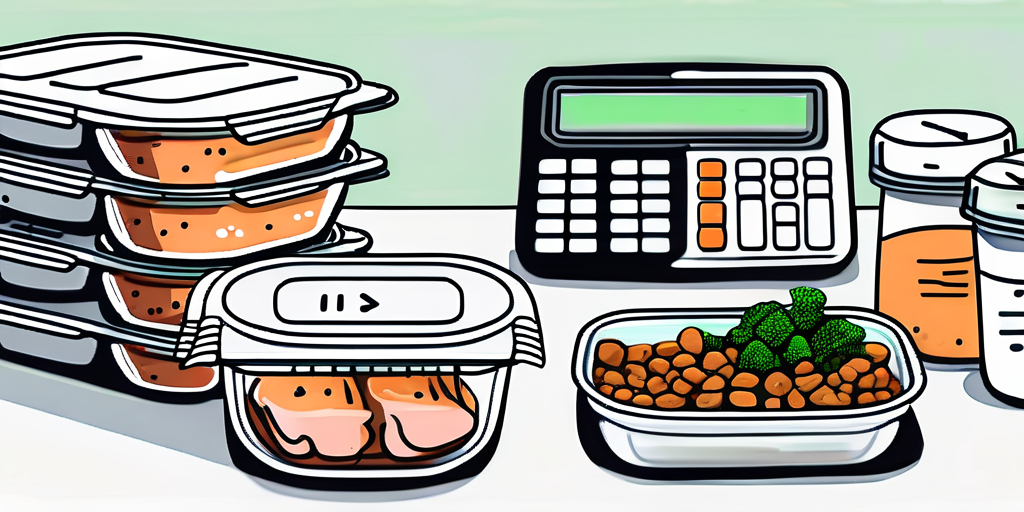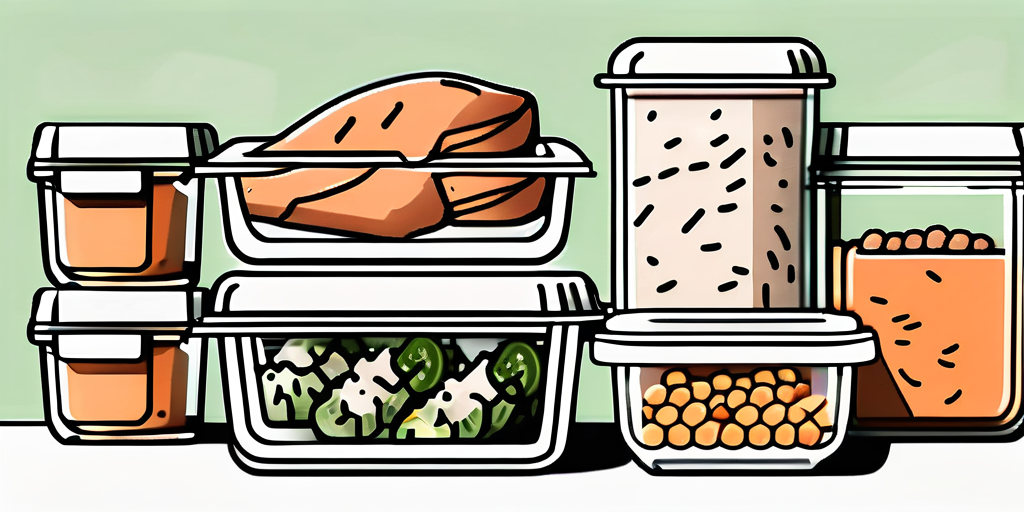
Does Meal Prepping Save Money? Discover the Financial Benefits
Meal prepping has become an increasingly popular way to save time and stay on track with healthy eating. But did you know that it can also have significant financial benefits? In this article, we will dive deep into the concept of meal prepping and explore how it can help you save money.
Understanding the Concept of Meal Prepping
Before we delve into the financial implications, let’s start by understanding what exactly meal prepping is. Meal prepping involves planning and preparing your meals in advance, typically for a week. It entails cooking and portioning out your meals ahead of time, so they are ready to eat whenever you need them.
Meal prepping is not just about saving time during the week; it’s also a great way to maintain a healthy diet and save money. By preparing your meals in advance, you can control portion sizes and ingredients, making it easier to stick to your dietary goals. Additionally, buying ingredients in bulk for meal prepping can often be more cost-effective than buying individual meals or eating out.
What is Meal Prepping?
At its core, meal prepping is a strategic approach to cooking and meal planning. It allows you to take control of your nutrition and ensures that you always have healthy, homemade meals available, even on your busiest days.
Meal prepping is also a fantastic way to reduce food waste. By planning your meals in advance and only buying what you need, you can minimize the amount of food that goes unused and ends up in the trash. This not only helps the environment but also saves you money in the long run.
The Basics of Meal Prepping
The process of meal prepping involves several key steps. First, you will need to decide what meals you want to prepare for the week. It could be breakfast, lunch, dinner, or all of the above. Next, make a shopping list based on your meal plan and head to the grocery store. Once you have all the ingredients, set aside some time to cook and portion out your meals into individual containers.
When meal prepping, it’s essential to consider factors like proper storage and reheating methods to maintain the quality and taste of your meals throughout the week. Investing in high-quality, reusable containers can help keep your food fresh and organized. Additionally, labeling your meals with dates can ensure you consume them before they spoil, maximizing both taste and nutritional value.
The Financial Implications of Meal Prepping
Now that we have a clear understanding of what meal prepping entails, let’s explore how it can help you save money.

Meal prepping is not only a time-saving strategy but also a budget-friendly one. By planning your meals in advance and preparing them ahead of time, you are not only saving yourself the stress of figuring out what to eat each day but also avoiding the temptation to order expensive takeout or dine out at restaurants frequently.
How Meal Prepping Can Reduce Food Waste
One of the biggest culprits of wasted money when it comes to food is spoilage. We’ve all been guilty of buying fresh produce with all the best intentions, only to forget about it and find it rotten in the back of the fridge. With meal prepping, you have a plan in place for everything you buy, drastically reducing the chances of food going to waste. By using up all the ingredients you purchase, you’re maximizing your grocery budget and minimizing food waste.
Additionally, meal prepping allows you to take advantage of bulk buying and sales. When you plan your meals in advance, you can purchase ingredients in larger quantities, which are often more cost-effective. By buying in bulk, you can save money in the long run and ensure that you always have essential items on hand without having to run to the store frequently.
Meal Prepping vs Eating Out: A Cost Comparison
Eating out can be incredibly convenient, but it often comes with a hefty price tag. When you meal prep, you are essentially bringing your own homemade meals wherever you go. This means you can avoid those expensive lunches at restaurants or grabbing takeout on a whim. By cooking your meals in bulk and portioning them out, you’ll likely find that the cost per meal is significantly lower compared to eating out regularly.
Moreover, meal prepping allows you to control the quality of ingredients you use, ensuring that you are consuming nutritious and wholesome meals. By preparing your food at home, you can choose fresh, high-quality ingredients and tailor your meals to meet your dietary preferences and nutritional goals. This level of control not only benefits your health but also your wallet in the long term.
The Hidden Savings of Meal Prepping
While the direct financial benefits of meal prepping are evident, there are also some hidden savings that can be equally impactful.
Time is Money: Efficiency in Meal Prepping
With meal prepping, you invest time upfront to save time later. By dedicating a few hours on a Sunday or any other designated day, you can prepare all your meals for the week. This means you won’t have to spend time every day deciding what to eat, cooking from scratch, or waiting for food to be delivered. The time you save can be used for other activities, including more productivity or relaxation, which may ultimately lead to financial gains or a better work-life balance.
Moreover, meal prepping can also enhance your culinary skills and creativity in the kitchen. As you plan and prepare meals in advance, you have the opportunity to experiment with new recipes, flavors, and cooking techniques. This can not only make your meals more enjoyable but also potentially save you money by reducing the temptation to dine out or order takeout for variety.
Health Benefits and Potential Savings on Medical Bills
Proper nutrition plays a significant role in our overall health and well-being. By meal prepping, you have full control over the ingredients you use and the portion sizes. This can result in healthier meals that can help you maintain or improve your health. By taking care of your body through meal prepping, you may reduce your risk of developing chronic illnesses, potentially saving money on medical bills and medications in the long run.
Furthermore, meal prepping can lead to a reduction in food waste. When you plan your meals in advance and portion out ingredients accordingly, you are less likely to buy excess food that may spoil before you can use it. This mindful approach not only contributes to cost savings by maximizing the use of groceries but also aligns with sustainable practices, reducing your environmental impact.
Tips for Effective and Economical Meal Prepping
Now that you understand the financial benefits of meal prepping, let’s explore some tips to make your meal prepping journey efficient and cost-effective.

Meal prepping not only saves you money but also time and effort throughout the week. By dedicating a few hours on a weekend to prepare your meals in advance, you can avoid the stress of cooking every day and ensure that you have healthy and delicious options readily available.
Planning Your Meals for the Week
Before you head to the grocery store, take some time to plan your meals for the week. This will help you create a shopping list based on what you actually need, minimizing impulse purchases and reducing overall grocery costs. Look for recipes that use similar ingredients to make the most of what you buy.
Consider incorporating seasonal produce into your meal plan to take advantage of lower prices and fresher ingredients. Planning your meals around what’s in season can add variety to your diet and support local farmers.
Shopping Smart for Meal Prepping
When shopping for your meal prep ingredients, keep an eye out for sales and discounts. Buying in bulk can often be more cost-effective, especially for items like grains, legumes, and frozen produce. Additionally, consider purchasing store-brand products, as they often offer similar quality at a lower price.
Don’t forget to check your pantry and fridge before heading to the store to avoid duplicating ingredients you already have. This simple step can prevent food waste and save you money by using up items you already own.
Overcoming Common Meal Prepping Challenges
As with any habit, meal prepping comes with its own set of challenges. Let’s address a couple of common obstacles and how to overcome them.
Addressing the Issue of Variety
Some people worry that meal prepping can lead to repetitive and boring meals. However, with a little creativity, this doesn’t have to be the case. You can experiment with different flavors, seasonings, and cooking methods to keep your meals interesting. Additionally, setting aside one or two days for meal prep and leaving the rest of the week open for flexibility can help you maintain variety in your diet.
Another way to add variety to your meal prep is by incorporating theme nights. For example, designate Mondays as Mexican night, Wednesdays as Italian night, and Fridays as Asian night. This approach not only adds excitement to your meals but also makes grocery shopping and meal planning more streamlined and efficient. By rotating different cuisines throughout the week, you can enjoy a diverse range of flavors and ingredients without feeling like you’re eating the same thing every day.
Dealing with Time Constraints
Time constraints are often cited as a reason for not meal prepping. However, you don’t have to devote an entire day to meal prepping if time is limited. Utilize time-saving cooking techniques like batch cooking or using kitchen appliances like slow cookers or Instant Pots. Even prepping just a few meals in advance can still provide financial benefits and save you time during busy weekdays.
If you find yourself constantly pressed for time, consider involving your family or roommates in the meal prep process. Not only does this divide the workload, but it also fosters a sense of teamwork and shared responsibility. You can assign different tasks to each person, such as chopping vegetables, marinating proteins, or assembling meals, making the process quicker and more enjoyable for everyone involved. Additionally, turning meal prep into a social activity can turn a mundane chore into a fun bonding experience.
As you can see, meal prepping not only helps you stay organized and eat healthier but also offers significant financial benefits. By reducing food waste, avoiding eating out, and saving time, you can improve your financial well-being while enjoying delicious homemade meals. So why not give meal prepping a try and discover the positive impact it can have on your wallet?

